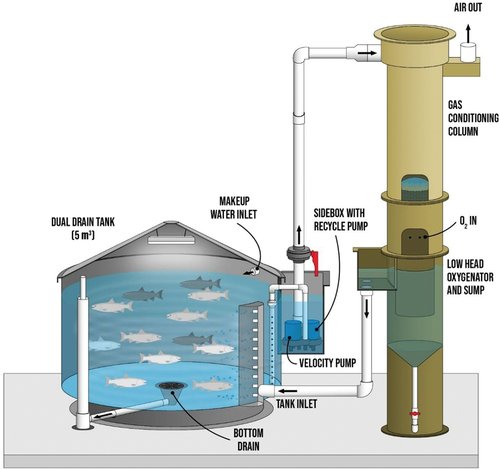
Depuration is a process conducted before harvest to eliminate the ‘muddy’ taste from salmon and other fish raised in recirculation systems. However, this procedure results in weight loss for the salmon.
Although depuration has been proven effective, various scientific studies have reported that purged salmon lose weight during fasting, subsequently reducing the income for fish farmers.
In this context, researchers from The Conservation Fund Freshwater Institute and Agricultural Research Service evaluated low-ration feeding as a method to mitigate weight loss during the depuration of 3 to 4 kg Atlantic salmon.
To carry out this study, a group of Atlantic salmon was implanted with integrated passive transponders for tracking. These fish were exposed to concentrated geosmin (GSM) and 2-methylisoborneol (MIB), two compounds responsible for the undesired taste. Subsequently, they were distributed into eight previously disinfected partial reuse systems.
Two treatment groups were established: one group was provided with food for 4 days, while the other group completely abstained from feeding during a 6-day depuration period. Each group consisted of four specimens.
The goal was to compare the impact of feeding on weight loss and the elimination of the undesired taste.
Study results
Concentrations of GSM and MIB
The study results provided valuable information. First, it was demonstrated that both the fed and fasted salmon effectively eliminated GSM and MIB, the compounds responsible for the off-flavor.
However, significant differences in the levels of these compounds were observed in the salmon from both groups. The fasting salmon during purging had slightly higher levels of GSM and MIB.
Weight loss
Regarding weight loss, the results are equally noteworthy. The study results confirm that commercially sized Atlantic salmon lose weight during depuration periods.
Fed salmon during purging lost 0.3% of their initial weight, while fasting salmon lost 1.1% of their initial weight. These results are statistically significant and suggest that feeding during purging can minimize weight loss.
Economic evaluation
When researchers considered the weight loss data, RAS operations producing 2,000, 5,000, and 10,000 ™ of salmon per year, selling fresh fish, estimated losses of approximately US$154,000, US$385,000, and US$770,000, respectively, when purging salmon for 6 days.
However, with reduced-ration feeding, RAS salmon farming operations can save between US$100,000 and US$500,000 per year.
Implications for the salmon industry
This study holds significant implications for the aquaculture industry, particularly for Atlantic salmon producers in RAS. Purging is an essential process to ensure that salmon produced in recirculating aquaculture systems do not have unpleasant tastes. However, weight loss during depuration can negatively affect fish farm revenues.
The results of this research indicate that feeding during the depuration process can be an effective strategy to minimize weight loss without compromising the removal of the unwanted taste. This represents an opportunity for salmon producers to maintain the profitability of their operations without compromising the quality of the final product.
Feeding with low rations during purging is a promising strategy that could benefit both producers and consumers of Atlantic salmon by ensuring the quality and profitability of aquaculture production.
“However, the decision to feed with a reduced ration during depuration likely depends on specific site aspects, including the form of the final product the farm markets, the sale of byproducts, etc.,” recommend the researchers.
The study was funded by BARD, The United States – Israel Binational Agricultural Research and Development Fund.
Contact
John Davidson
The Conservation Fund Freshwater Institute
Shepherdstown, West Virginia, USA
Email: jdavidson@conservationfund.org
Reference (open access)
John Davidson, Kevin Schrader, Travis May, Anna Knight & Marcuslene Harries (2023) Evaluating the feasibility of feeding RAS-produced Atlantic salmon (Salmo salar) during the depuration process: effects on fish weight loss and off-flavor remediation, Journal of Applied Aquaculture, DOI: 10.1080/10454438.2023.2259892
Editor at the digital magazine AquaHoy. He holds a degree in Aquaculture Biology from the National University of Santa (UNS) and a Master’s degree in Science and Innovation Management from the Polytechnic University of Valencia, with postgraduate diplomas in Business Innovation and Innovation Management. He possesses extensive experience in the aquaculture and fisheries sector, having led the Fisheries Innovation Unit of the National Program for Innovation in Fisheries and Aquaculture (PNIPA). He has served as a senior consultant in technology watch, an innovation project formulator and advisor, and a lecturer at UNS. He is a member of the Peruvian College of Biologists and was recognized by the World Aquaculture Society (WAS) in 2016 for his contribution to aquaculture.
